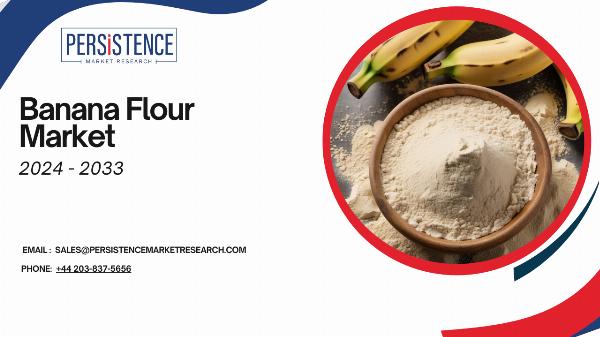Banana Flour: A Comprehensive Guide to This Nutrient-Dense Ingredient

Strong 8k brings an ultra-HD IPTV experience to your living room and your pocket.
Banana flour, made from unripe green bananas or plantains, is rapidly gaining popularity in the health food community as a versatile and nutritious alternative to traditional flours. With its unique flavor profile and impressive nutritional benefits, banana flour is an excellent addition to a balanced diet. In this comprehensive guide, we will explore what banana flour is, its health benefits, culinary uses, and tips for incorporating it into your meals.
For More Industry Insight: https://www.persistencemarketresearch.com/market-research/banana-flour-market.asp
What is Banana Flour?
Banana flour is produced by peeling, drying, and grinding green bananas or plantains into a fine powder. Unlike traditional flours derived from grains, banana flour retains many of the nutrients found in whole bananas, making it a nutrient-dense option. Its mild, slightly sweet flavor makes it a suitable ingredient for both sweet and savory dishes, offering versatility in various culinary applications.
Nutritional Profile
Banana flour is a powerhouse of nutrition, offering several essential vitamins and minerals:
High in Resistant Starch: One of the standout features of banana flour is its high content of resistant starch, a type of dietary fiber that acts as a prebiotic. Resistant starch supports gut health by promoting the growth of beneficial gut bacteria and aiding digestion.
Rich in Vitamins and Minerals: Banana flour contains essential nutrients, including potassium, vitamin C, and vitamin B6. Potassium is vital for maintaining healthy blood pressure and heart function, while vitamin C serves as an antioxidant, supporting immune health and skin vitality. Vitamin B6 is essential for brain health and the production of neurotransmitters.
Low in Fat and Calories: Banana flour is naturally low in fat and calories compared to many other flour alternatives. This makes it an appealing option for those looking to manage their weight without sacrificing flavor or nutrition.
Health Benefits of Banana Flour
1. Promotes Digestive Health
The resistant starch in banana flour not only aids in digestion but also helps maintain a healthy gut microbiome. By feeding beneficial bacteria in the gut, resistant starch can enhance overall digestive function and may alleviate issues like constipation. Regular consumption of banana flour may contribute to improved bowel health and overall digestive well-being.
2. Regulates Blood Sugar Levels
Banana flour has a low glycemic index, making it an excellent choice for individuals managing blood sugar levels. The resistant starch slows down the digestion and absorption of carbohydrates, leading to more stable blood sugar levels. This can be particularly beneficial for those with diabetes or insulin sensitivity, helping to reduce the risk of spikes in blood sugar.
3. Supports Weight Management
The fiber content in banana flour promotes feelings of fullness, which can help control appetite and reduce overall caloric intake. Including banana flour in meals can assist with weight management efforts by keeping you satisfied for longer periods, thereby reducing the likelihood of snacking between meals.
4. Gluten-Free Alternative
For individuals with celiac disease or gluten intolerance, banana flour is a safe and delicious alternative to traditional wheat flour. Its gluten-free nature makes it suitable for a wide range of recipes, from baked goods to sauces and soups, without compromising on taste or texture.
Culinary Uses
Banana flour is incredibly versatile and can be used in various culinary applications:
1. Baking
Banana flour can replace a portion of traditional flour in many baking recipes. It works well in pancakes, muffins, cookies, and breads. A good rule of thumb is to substitute 25-30% of the wheat flour with banana flour to maintain the desired texture and flavor.
2. Thickening Agent
Due to its fine texture and ability to absorb moisture, banana flour can be used as a natural thickening agent for sauces, soups, and gravies. It blends seamlessly into liquids, providing a smooth consistency without altering the flavor of the dish.
3. Smoothies and Shakes
Adding banana flour to smoothies and shakes can enhance their nutritional profile. Its mild flavor complements fruits and other ingredients, while its fiber content helps create a satisfying and filling drink.
4. Baby Food
Banana flour is an excellent option for homemade baby food. Its natural sweetness and smooth texture make it a great addition to purees and cereals for infants. When mixed with water or milk, banana flour creates a creamy consistency that is easy for babies to digest.
Tips for Incorporating Banana Flour into Your Diet
Start Small: If you're new to using banana flour, begin by substituting a small portion of the flour in your recipes. This will help you gradually adjust to the taste and texture.
Combine with Other Flours: For optimal results in baking, consider combining banana flour with other gluten-free flours like almond flour or coconut flour. This can enhance the flavor and texture of your baked goods.
Experiment with Recipes: Don't hesitate to get creative! Banana flour can be used in various recipes beyond baking, such as smoothies, sauces, and even savory dishes.
Note: IndiBlogHub features both user-submitted and editorial content. We do not verify third-party contributions. Read our Disclaimer and Privacy Policyfor details.







